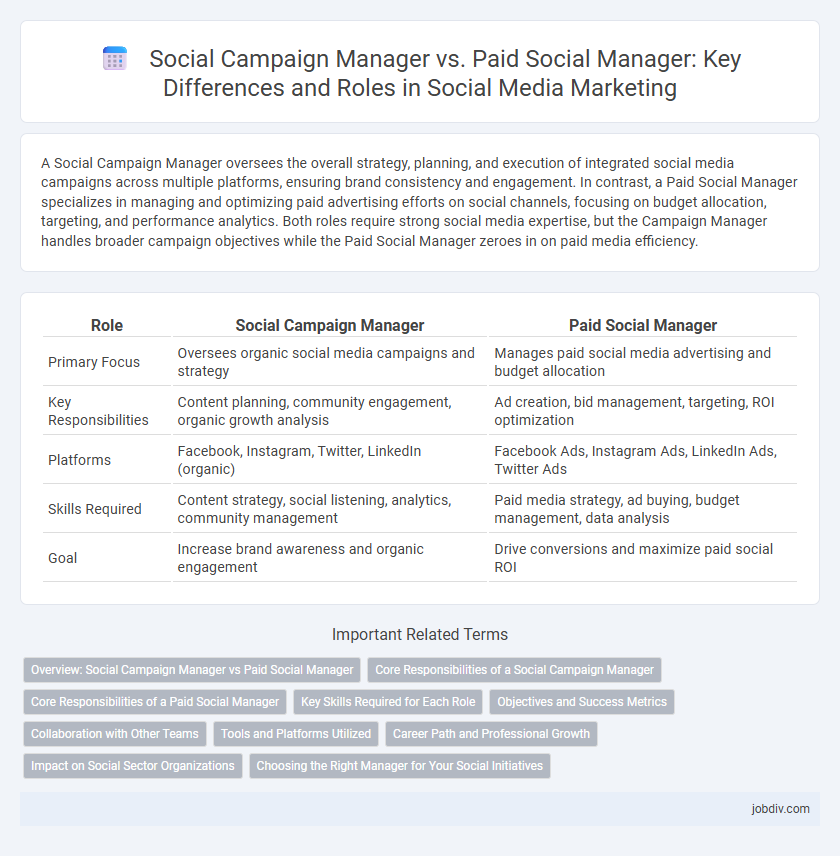A Social Campaign Manager oversees the overall strategy, planning, and execution of integrated social media campaigns across multiple platforms, ensuring brand consistency and engagement. In contrast, a Paid Social Manager specializes in managing and optimizing paid advertising efforts on social channels, focusing on budget allocation, targeting, and performance analytics. Both roles require strong social media expertise, but the Campaign Manager handles broader campaign objectives while the Paid Social Manager zeroes in on paid media efficiency.
Table of Comparison
| Role | Social Campaign Manager | Paid Social Manager |
|---|---|---|
| Primary Focus | Oversees organic social media campaigns and strategy | Manages paid social media advertising and budget allocation |
| Key Responsibilities | Content planning, community engagement, organic growth analysis | Ad creation, bid management, targeting, ROI optimization |
| Platforms | Facebook, Instagram, Twitter, LinkedIn (organic) | Facebook Ads, Instagram Ads, LinkedIn Ads, Twitter Ads |
| Skills Required | Content strategy, social listening, analytics, community management | Paid media strategy, ad buying, budget management, data analysis |
| Goal | Increase brand awareness and organic engagement | Drive conversions and maximize paid social ROI |
Overview: Social Campaign Manager vs Paid Social Manager
A Social Campaign Manager oversees the strategic planning and execution of multi-platform social media campaigns, ensuring brand consistency and audience engagement across organic and paid channels. In contrast, a Paid Social Manager specializes in managing and optimizing paid advertising campaigns on social media platforms like Facebook, Instagram, and LinkedIn to maximize ROI and drive targeted traffic. Both roles require deep understanding of social media metrics, but the Social Campaign Manager focuses more on broader campaign objectives while the Paid Social Manager concentrates on budget allocation and ad performance analysis.
Core Responsibilities of a Social Campaign Manager
A Social Campaign Manager focuses on strategizing, creating, and executing integrated marketing campaigns across multiple social media platforms to drive brand awareness and engagement. They analyze campaign performance metrics, optimize ad placements, and coordinate with creative teams to ensure cohesive messaging. Their core responsibilities include audience targeting, budget management, and aligning campaigns with overall marketing objectives to maximize ROI.
Core Responsibilities of a Paid Social Manager
A Paid Social Manager specializes in strategizing, executing, and optimizing paid advertising campaigns across platforms like Facebook, Instagram, LinkedIn, and Twitter to drive targeted traffic and conversions. Their core responsibilities include analyzing paid media performance metrics, managing budget allocation, and refining ad creatives and targeting to maximize ROI. They collaborate closely with data analysts and creative teams to ensure campaigns align with business goals and deliver measurable results.
Key Skills Required for Each Role
A Social Campaign Manager must excel in strategic planning, audience segmentation, and content optimization to drive organic engagement and brand awareness. A Paid Social Manager requires expertise in budget management, bid strategies, and detailed analytics to maximize ROI on paid social media ads. Both roles demand strong knowledge of social platforms, data interpretation skills, and the ability to adapt campaigns based on performance metrics.
Objectives and Success Metrics
Social Campaign Managers prioritize holistic brand engagement and audience growth, measuring success through metrics like organic reach, brand sentiment, and overall social media traffic. Paid Social Managers focus on targeted ad performance with objectives centered on ROI, conversions, and cost per acquisition (CPA). Success for Paid Social involves optimizing ad spend efficiency, click-through rates (CTR), and direct sales impact.
Collaboration with Other Teams
Social Campaign Managers coordinate closely with content creators and analytics teams to ensure cohesive messaging and campaign effectiveness. Paid Social Managers collaborate primarily with media buying and optimization specialists to maximize ad spend efficiency and audience targeting. Both roles require strong cross-functional communication to align campaign goals and achieve optimal social media performance.
Tools and Platforms Utilized
Social Campaign Managers leverage comprehensive marketing platforms like HubSpot, Hootsuite, and Google Analytics to design, execute, and measure multi-channel campaigns, ensuring brand consistency and cross-platform performance tracking. Paid Social Managers specialize in advanced ad platforms including Facebook Ads Manager, LinkedIn Campaign Manager, and Twitter Ads to optimize paid social strategies, targeting, and budget allocation with granular control over audience segmentation and bidding. Both roles utilize insights from tools such as Sprout Social and SEMrush to analyze social metrics, but their toolsets diverge based on the emphasis on organic versus paid media management.
Career Path and Professional Growth
A Social Campaign Manager typically oversees the strategic planning and execution of multi-channel social media campaigns, emphasizing audience engagement and brand awareness, which fosters a broad skill set in campaign management and cross-functional collaboration. In contrast, a Paid Social Manager specializes in the optimization and analysis of paid social advertising, offering deep expertise in budget management, ad targeting, and performance metrics, which can lead to advanced roles in digital advertising strategy and media buying. Both career paths provide opportunities for professional growth, with the Social Campaign Manager track often leading to senior marketing or communications leadership, while the Paid Social Manager route can advance toward roles such as digital media director or performance marketing lead.
Impact on Social Sector Organizations
Social Campaign Managers drive awareness and engagement by crafting targeted narratives that resonate with diverse audiences, boosting nonprofit visibility and community support. Paid Social Managers optimize budget allocation for paid advertisements, increasing reach and measurable outcomes through data-driven strategies tailored to social sector priorities. Together, their collaboration enhances the effectiveness and sustainability of social sector organizations' digital presence and impact.
Choosing the Right Manager for Your Social Initiatives
Choosing the right manager for your social initiatives depends on the campaign's goals and budget allocation. Social Campaign Managers excel in overseeing comprehensive strategies across multiple platforms, ensuring cohesive messaging and organic engagement. Paid Social Managers specialize in optimizing ad spend, targeting, and performance metrics to maximize ROI through paid social media channels.
Social Campaign Manager vs Paid Social Manager Infographic

 jobdiv.com
jobdiv.com